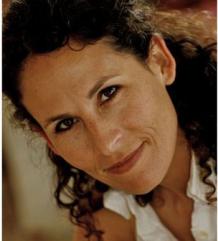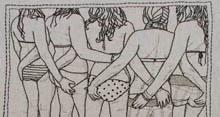Shira Richter
Heroes
Exclusive one-on-one interviews with extraordinary individuals working on behalf of women, children, and families worldwide.

HER DREAM
I remember sitting there, after having these two people come out of my body, this new life (which is really spooky in itself), with my body all wrecked and exhausted, hurting and bleeding, seeing all these people around me. I was thinking, “He came out of the body a woman, he came out of the body of a woman, so did he,” and suddenly you realize that the whole of humanity came out from between your legs. We forget we have a power that is very deep. This ruling power is why people are afraid of us. The world does what it can to take this influence away, it devalues and exhausts us. Women need to assert this power and say, “Cut it out!” My “naïve” dream is that we just won’t tolerate it anymore.That by valuing "mothering" as central to our humanity, humanity will be transformed. My other dream is that Gender Studies will be part of the formal curriculum of educational systems all over the world. I am one of the active leaders of this initiative in Israel.
WHY SHE’S A HERO
By challenging the world to uphold the art of motherhood, and asking provocative questions about society’s treatment of mothers, Shira is breaking new ground in the art world.
A CHAT WITH HERO SHIRA RICHTER
IMOW: You were an artist before you became a mother. How has motherhood changed you as an artist? As a person?
SHIRA: There is a before and after my family came to Israel from the United States, and there’s a before and after I became a mother. I connect these two transitions because in each you are moving to a new terrain and a transformation occurs. This concept is what I strongly hint at in my project, The Mother, Daughter, and Holy Spirit. It’s a totally new world, one from which you don’t come back.
I did not make this change consciously. I understood what happened in retrospect. Becoming a mother to twins means the time to create art shrank considerably, and it became so completely fragmented that my films became fragmented, turning instead into photographs on the wall, writings, mini-films, and lectures. It was like somebody stepped on me, like you step on a bug, and everything flew all over the walls and instead of a film you get these fragmented, yet still connected, pieces.

IMOW: What was the impetus for creating The Mother, Daughter, and the Holy Spirit? What’s the meaning behind it?
SHIRA: There are many, but my main purpose was to create a very large scale monument to this transition into motherhood. I live in Israel and noticed that the only mentioning of the birth process in the bible is –actually- a curse: In sorrow ye shall bear sons (Genesis 3:16). I wanted a blessing—a celebration for this humongous achievement! Our culture celebrates several transitions: a Bar Mitzvah or a Bat Mitzvah celebrates the transition from childhood to adulthood. Then there are weddings to celebrate the transition from being single to being a couple. And when you have a child there is a Brith*- which has nothing to do with the woman, or couple. There is absolutely no event that celebrates a woman’s transformation into a mother, which is one of the biggest and most physical in her life. The Mother, Daughter, and Holy Spirit is a powerful monument that celebrates and acknowledges the meaning and depth of this transition.
One of the central questions The Mother, Daughter, and Holy Spirit asks is why textures and topographies that we consider beautiful in nature, we see as hideous and ugly on our own bodies. My photographs of the "secret hidden" part of a women's body look like a bird's eye view of the Sahara from an airplane although they are of a scarred, stretched Skin. Women—especially mothers—are treated the same way western culture treats nature. It’s no coincidence that I, living in Israel, in the Middle East, which is occupied with conflicts about land and territories, turn my camera towards the land and territory of my so called "wrecked body." "Mother earth" is us. The fight should be for supporting us, our health, our rights—not for an external land.

IMOW: You talk about “voice” in your work a lot—when you talk about universality of an issue like the status of mothers in society- how do you address that in your work without being presumptuous?
SHIRA: I start from myself—my own body, my own experience. Then, before I show my work to the world, I start showing it around to friends. If it causes other people to share their own stories, it's a sign the work has universal qualities, and thus a purpose in the outer world. The Mother, Daughter, and Holy Spirit acted like a zipper. Women opened up and their stories started pouring out. It even affected the professionals with whom I work. Many would come to me and say, “Since I’ve heard you speak, I’ve changed the way I work with women.” This was fascinating to me because I didn't think I was showing these doctors, midwives, plastic surgeons, etc. anything they already didn't know. They worked with women and they see this crinkled skin every day. For instance, after a long silent pause a plastic surgeon said to me, "You know, I never really thought about the meaning of it all. Yesterday I was at a funeral of a woman who died in child labor. I can't forget the words of the husband; ‘I never thought someone could die from this.’"
IMOW: Women often ask themselves: “Am I a good mother?” or “Am I really cut out to be a mother?” Are these questions you pose in your work?
SHIRA: I think we have to stop monitoring other women and their choices. How another woman mothers, looks, or dresses, what or how she eats---we are always monitoring and judging other women. Societal and social expectations do this to us. Instead of measuring each other like that and becoming accomplices in the patriarchal measuring system, my work questions the bigger context. Does society give women what they need in order for them to mother well?Does Israel, a leading country in subsidizing fertility treatments really value this baby once it's born? My project Invisible Invaluables explores status symbols for the invisible economy of mothering, translated the work of feminist economist Marilyn Waring to the language of art and to the local economical system. It shows how Israel is governed by the same global economical system, which does not count producing and sustaining a life as valuable.
IMOW: Explain your “Big Camera” theory. How do you think mass media has influenced how Israelis and/or Westerners view motherhood?
SHIRA: Israel is connected to western mass media and therefore suffers from the same maladies as other cultures; the images of motherhood that surround us are very sweet and perfect. A mother is usually used to sell (advertise) toilet paper, diapers, baby formula, or the next line of food products, and her own voice is rarely heard.

Recently, I was invited to talk about my work Live, on mainstream TV. The occasion was my work in an exhibit on the subject of postpartum depression. After taking me by surprise by telling me (live) they were not comfortable showing my work, saying "the images are hard to digest and troublesome," they continued by asking “please tell us, is this subject really such a big deal?” This seemed so ridiculous that I answered: "The fact that you are censoring my work in itself demonstrates what a big deal this issue is. Why is extreme violence, which you show on TV every day, considered ‘easy’ to digest, while a natural postpartum woman’s body in art form is not?"
IMOW: What was your own experience like when you had your twins? Did you experience depression or feel like there was nobody to help or support you through all the shock and confusion?
SHIRA: I have been very active and very vocal and I am not alone in the world in the idea that postpartum depression does not exist. This statement may initially offend women who have suffered through postpartum depression. What I mean is something different, however. I don’t mean that these women don’t suffer. On the contrary—the suffering is very real. I am trying to say that what happens to her postpartum has less to do with the woman's hormones and personality and more to do with how the world around her treats her. The woman’s feelings of shock or confusion are completely normal reactions to a totally abnormal situation.
I did not experience postpartum depression because of my feminist consciousness. It is not that I did not have a hard time; I had an excruciatingly hard time. I had absolutely no family support. In fact, no one understood why we didn’t have time for them anymore! Depression means you depress your feelings, I did not. I cursed, I shouted, I did my art, I ran away from home and I came back, I got it out there. I knew I was entitled to my feelings and I knew my partner was entitled to his feelings. I had compassion for him and what he was going through as well.
Birth and motherhood are huge transformations and society treats it as, “ho hum, you just had a kid, when are you coming back to work?” The majority of women do not have this “ho hum” experience. Most countries do not have systems that support women and their families as they should.
IMOW: Can you tell me something maybe others don’t know about you?
SHIRA: As part of my political activism for equality between the sexes I am currently leading, together with other activist groups and individuals, an initiative to include gender studies in the main educational system from kindergarten and onward. In my view this seems the best "public health" solution to so many of our gender identity problems in the world. I am passionate about this because knowledge saves lives. I know, because this brand of knowledge saved mine.
IMOW: What do you like most about being a mother? The least?
SHIRA: Motherhood teaches me things that I think would be hard to learn from any other experience. Also, looking at this really weird thing of bringing life forth from your body and then seeing how it grows into an individual, brings awe. You see the power of life which does not stop at you and me; it is much bigger than us. It is so strong that it comes out of cracks, out of devastation and ruin. It is a force that will live and it will continue to grow. (This theme can be seen in my photograph "Sprouts"),

The least pleasing thing about being a mother is that you cannot turn in a letter of resignation. Although I have an imaginary one I submit every month or so. It helps to say out loud "I resign!" I have one minute resignation letters, half hour ones, whole day ones. I recommend this, it keeps one's sense of humor and sanity.
There are also scary parts to motherhood: With this new life, comes a new dimension of fear. Fear of loss and death. When you’re not a parent, I think, you don’t fear death like you do when you become one. Now that I am a parent, I fear losing in an extremely painful way. This fear of losing my children, the fear of death, becomes much bigger.
IMOW: How can visitors to the exhibition help to promote women and mother artists like you get their work shown?
I think the meaning of art in our lives as humans is misunderstood and minimized, in a similar way mothers are misunderstood and their needs trivialized. Activism means changing how we see the world. And changing the images that surround us helps to change our vision. Here in Israel, I know male artists who have patrons who realize that artists need a salary in order to create art. On a personal note, obviously I would love to have a patroness! There are absolutely no patrons for women! Strong, powerful women or men who are feminists and who realize the importance of feminist art should really think of supporting and encouraging female artists, especially women artists who are also mothers.
*"Brith" (for a baby boy) or "Brita" (for a baby girl) is the celebration of having a child on the eighth day of their life. The Jewish tradition performs Circumcision on a male child.
Author Photo credit: Freda Elliot-Wilson
Take Action
Find out more about Shira’s work, writings and lectures at: www.shira-richter.com.
Related Content
|
A woman's worth is often evaluated based on her performance as a mother, but Hafsat Abiola says it's even more important for women to make a difference outside the home. |
The past century has brought more abundant choices for many of the world’s women, but when it comes to motherhood, the choice seems to be "all or nothing." |
Kathy Halper's tongue-in-cheek, Facebook-inspired embroideries explore how technology affects the modern mother/child relationship. |
Blessing Musariri tells the story of Tinashe, a young Zimbabwean boy. When his mother takes Tinashe away with her in hopes of starting a new life, her young son must confront incomprehensible loss. |





